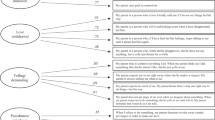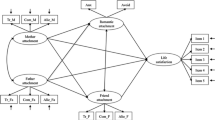Abstract
Childhood parentification has been associated with both positive and negative psychosocial outcomes. While divergent effects of parentification have been documented, few studies have attempted to identify variables that may impact the relationship between parentification and later adjustment. In the present study, internal locus of control, a variable associated with positive adjustment, was hypothesized as a potential moderating variable in the relationship between parentification and outcome. Using an undergraduate sample, internal locus of control was found to significantly moderate the relationship between childhood parentification and current ratings of depression and happiness. Theoretical rationales for the findings are discussed.
Similar content being viewed by others
References
Bandura, A. (1991). Social cognitive theory of self-regulation. Organizational Behavior and Human Decision Processes, 50, 248–287.
Barnett, B., & Parker, G. (1998). The parentified child: Early competence or childhood deprivation? Child Psychology and Psychiatry Review, 3, 146–155.
Burger, J. M. (1984). Desire for control, locus of control, and proneness to depression. Journal of Personality, 52, 71–89.
Castro, D. M., Jones, R. A., & Mirsalimi, H. (2004). Parentification and the impostor phenomenon: An empirical investigation. American Journal of Family Therapy, 32, 205–216.
Chase, N. D. (1999). Parentification: An overview of theory, research, and societal issues. In N. D. Chase (Eds.), Burdened children. Theory, research and treatment of parentification, (pp. 3–33). Thousand Oaks, CA: Sage.
Chase, N. D., Deming, M. P., & Wells, M. C. (1998). Parentification, parental alcoholism and academic status among young adults. American Journal of Family Therapy, 26, 105–114.
Compas, B. E., Connor-Smith, J. K., Saltzman, H., Harding Thomsen, A., & Wadsworth, M. E. (2001). Coping with stress during childhood and adolescence: Problems, progress, and potential in theory and research. Psychological Bulletin, 127, 87–127.
Earley, L., & Cushway, D. (2002). The parentified child. Clinical Child Psychology and Psychiatry, 7, 163–178.
Frazier, L. D., Newman, F. L., & Jaccard, J. (2007). Psychosocial outcomes in later life: A multivariate model. Psychology and Aging, 22, 676–689.
Gale, C. R., Batty, G. D., & Deary, I. J. (2008). Locus of control at age 10 years and health outcomes and behaviors at age 30 years: The 1970 British cohort study. Psychosomatic Medicine, 70, 397–403.
Hooper, L. M. (2007). Expanding the discussion regarding parentification and its varied outcomes: Implications for mental health research and practice. Journal of Mental Health Counseling, 29, 322–337.
Jurkovic, G. J. (1997). Lost childhoods: The plight of the parentified child. Philadelphia, PA: Brunner/Mazel.
Levenson, H. (1974). Activism and powerful others: Distinctions within the concept of internal-external control. Journal of Personality Assessment, 38, 377–383.
Peris, T. S., Goeke-Morey, M. C., Cummings, E. M., & Emery, R. E. (2008). Marital conflict and support seeking by parents in adolescence: Empirical support for the parentification construct. Journal of Family Psychology, 22, 633–642.
Presson, P. K., Clark, S. C., & Benassi, V. A. (1997). The Levenson locus of control scales: Confirmatory factor analyses and evaluation. Social Behavior and Personality, 25, 93–104.
Rotter, J. B. (1966). Generalized expectancies for internal versus external control of reinforcement. Psychological Monographs, 80, 1–28.
Sessions, M. W., & Jurkovic, G. J. (1986). The Parentification Questionnaire. (Available from Dr. Gregory Jurkovic, Department of Psychology, Georgia State University, Atlanta Georgia, 30303).
Stein, J. A., Riedel, M., & Rotheram-Borus, M. J. (1999). Parentification and its impact on adolescent children of parents with AIDS. Family Process, 38, 193–208.
Stein, J. A., Rotheram-Borus, M. J., & Lester, P. (2007). Impact of parentification on long-term outcomes among children of parents with HIV/AIDS. Family Process, 46, 317–333.
Straus, M. A., & Kaufman Kantor, G. (2005). Definition and measurement of neglectful behavior: Some principles and guidelines. Child Abuse and Neglect, 29, 19–29.
Tompkins, T. L. (2007). Parentification and maternal HIV infection: Beneficial role or pathological burden? Journal of Child and Family Studies, 16, 113–123.
Weinberger, D. A. (1997). Distress and self-restraint as measures of adjustment across the life span: Confirmatory factor analysis in clinical and nonclinical samples. Psychological Assessment, 9, 132–135.
Weinberger, D. A., & Schwartz, G. E. (1990). Distress and restraint as superordinate dimensions of self-reported adjustment: A typological perspective. Journal of Personality, 58, 381–417.
Acknowledgments
This research was supported by funding from the Social Sciences and Humanities Research Council of Canada.
Author information
Authors and Affiliations
Corresponding author
Rights and permissions
About this article
Cite this article
Williams, K., Francis, S.E. Parentification and Psychological Adjustment: Locus of Control as a Moderating Variable. Contemp Fam Ther 32, 231–237 (2010). https://doi.org/10.1007/s10591-010-9123-5
Published:
Issue Date:
DOI: https://doi.org/10.1007/s10591-010-9123-5




